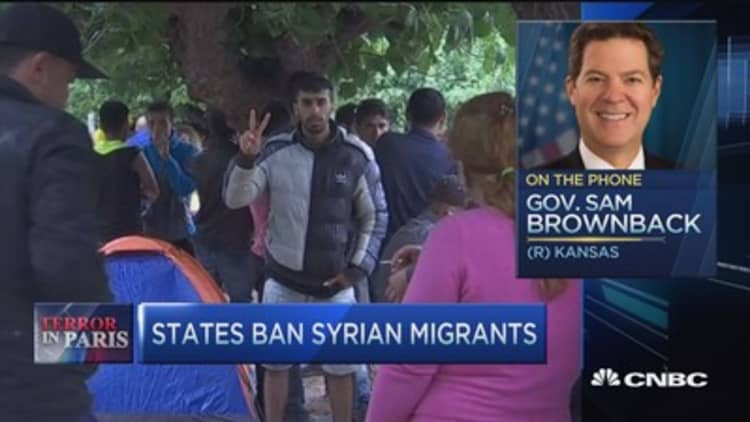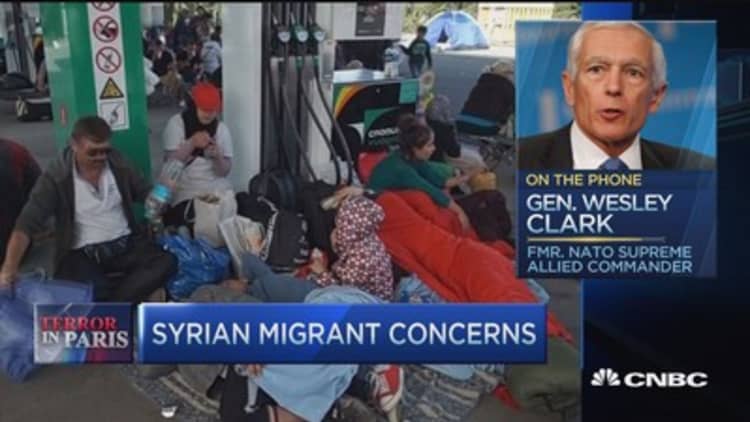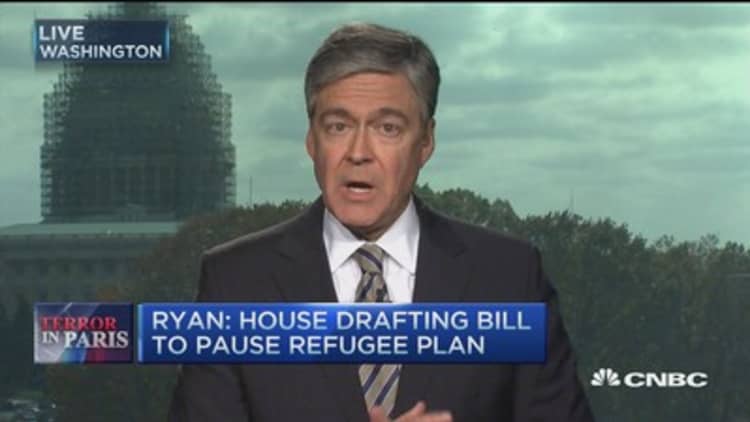



State and federal politicians across the U.S. have called for a block on Syrian refugees in the wake of the deadly terrorist attacks on Paris, saying it opens the country to unnecessary risks.
But about 2,200 refugees fleeing the violence in Syria have already been admitted into the United States, and officials point out that their screening process is much stricter than those applied to other people — tourists or workers, for example — who regularly enter the United States.
Worries about accepting refugees were stoked by reports that one of the suicide bombers in Paris, Ahmad Almohammad, carried a Syrian passport suggesting that took the Greek route now favored by Syrian migrants. French Justice Minister Christiane Taubira told NBC News that she doubted the authenticity of the passport, but many said it showed that terrorists from the so-called Islamic State sought to exploit the asylum being granted by the West.
"Our nation has always been welcoming, but we cannot let terrorists take advantage of our compassion. This is a moment where it's better to be safe rather than to be sorry," House Speaker Paul Ryan said Tuesday. "So we think the prudent, the responsible thing is to take a pause in this particular aspect of this refugee program in order to verify that terrorists are not trying to infiltrate the refugee population."
Those involved in the resettlement of refugees, including three senior administration officials, said the process is already intensely secure, and goes far beyond other standards for allowing admission into the country.
"I think a lot of the questions we're getting right now ... are from members (of Congress) who are just learning about the program for the first time," one administration official said when asked about claims that the screening process is not sufficient.
Read MoreAs governors decry migrants, Obama holds line
That process, officials explained, usually begins with the Office of the U.N. High Commissioner for Refugees (UNHCR) referring asylum-seekers to the U.S. government. Before anyone working for Washington looks into these refugees, the U.N. agency has conducted a series of background and identity checks, biometric screenings (through iris scans) and selected the most vulnerable individuals to be resettled, according to Brian Hansford, UNHCR's Washington, D.C., spokesman.
Less than 1 percent of the global refugee population is recommended for resettlement, he said.
"We have criteria, and because it's such a small number (of refugees who get resettled), we identify the most vulnerable of the vulnerable cases: Mothers looking after their children alone, victims of torture, unaccompanied children, persons with special medical needs and persons with LGBTI considerations as well," Hansford said.
The result is a population of refugees that is disproportionately children, one U.S. administration official said: About 50 percent of those who have been granted refugee status are kids, a quarter are adults over 60-years-old and only about 2 percent are single males of combat age.
Of the Syrian refugees who have been referred to the U.S. by the United Nations and others, about half end up accepted into the country, officials said. The American process includes security screenings from multiple agencies and extended in-person interviews with Homeland Security officers.
Syrian resettlement seekers undergo a further "enhanced review," which sees specialists review biographical claims. The Department of Defense and the FBI vet the refugees' biographic information against internal and shared databases, officials explained. The Defense Department, the FBI and Homeland Security all check fingerprints against their information holdings.
All told, the average vetting takes 18 to 24 months — with the process continuing for many years for some.
Some politicians have wrongly claimed that the U.S. is failing to screen refugees at all, while others allege that it is simply impossible to guarantee someone's identity when he or she comes from a war-torn, failed state.
Read MoreWhy NATO probably won't help France against ISIS
One administration official admitted that a lack of records is often a problem for refugees, but "in contrast to that," Syrians and Iraqis tend to be "a very, very heavily documented population." Trained U.S. specialists examine their passports, family registries and military records to assess authenticity, that official said.
Some security and law enforcement experts have expressed doubt that that is enough. FBI Director James Comey admitted in October that it's currently impossible to have a record of everyone in every country.
"We can only query against that which we have collected," Comey said at a congressional hearing, "and so if someone has never made a ripple in the pond in Syria in a way that would get their identity or their interest reflected in our database, we can query our database until the cows come home, but ... nothing will show up, because we have no record of that person."
"Refugees, including and especially those from Syria and the Middle East, are subject to the most intensive security screenings of anyone entering our country," said Betsy Fischer, deputy policy director at the International Refugee Assistance Project. "And because there are all of those security screenings, we think that calls for ceasing Syrian resettlementfundamentally betray a crucial American value."


